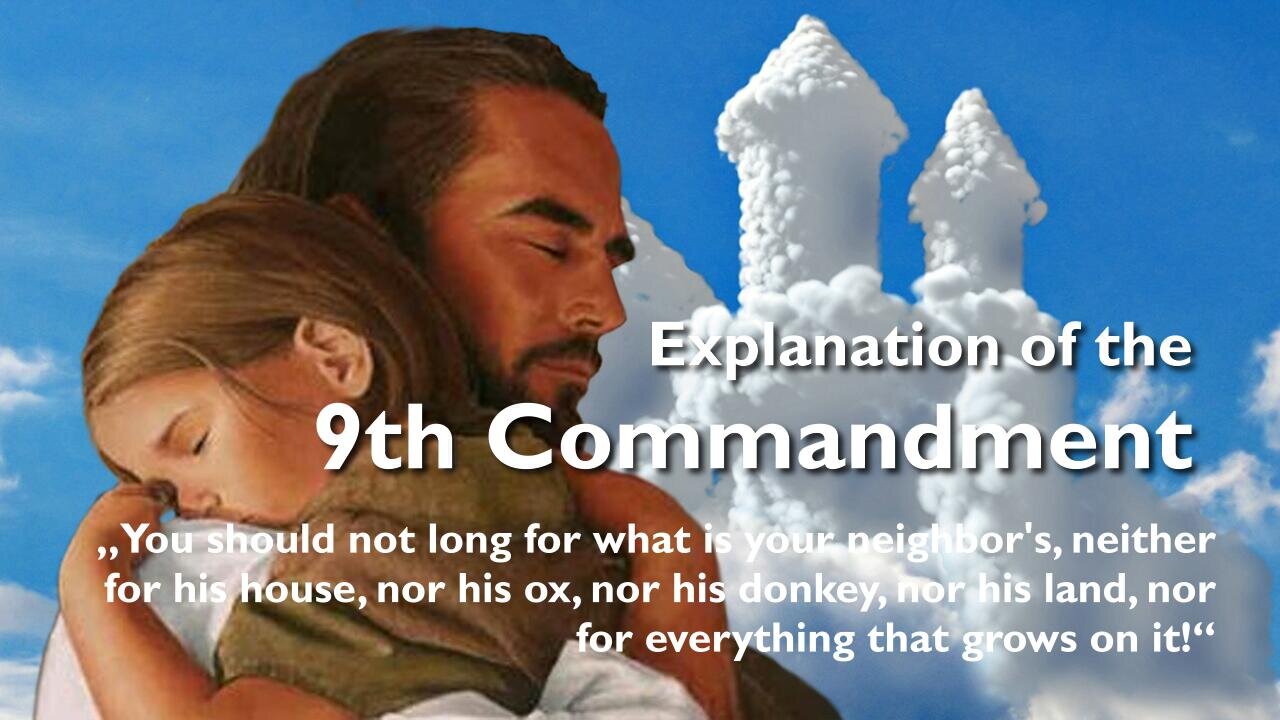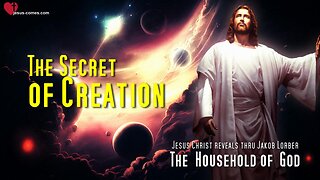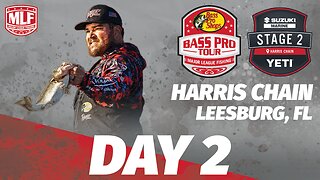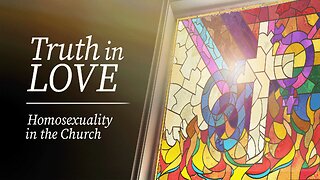Premium Only Content

Commandment 9 ❤️ You shall not covet, what is your Neighbour's... What does that mean?
Text & Audio to Videocontent & Related Messages... https://jesus-comes.com/index.php/2018/11/19/gebot-9-du-sollst-nicht-beneiden-commandment-9-you-shall-not-envy/
Channel Overview... https://jesus-comes.com/index.php/2022/10/16/kanalubersicht-channel-overview/
Video Playlist Commandments of God... https://www.youtube.com/playlist?list=PL73-eEs6JmCsw5J2MK1od7SnWFzMmUpBW
Commandments Overview... https://jesus-comes.com/index.php/2015/12/03/erlaeuterung-zu-den-zwoelf-geboten-des-herrn-10-gebote-moses-und-die-2-gebote-der-liebe-jakob-lorber/
Read online... https://search.jesus-comes.com/index.php?title=SSUN2-87
The Third Testament in various Languages... https://jesus-comes.com/index.php/das-dritte-testament-the-third-testament-el-tercer-testamento/
Jesus' Revelations thru Jakob Lorber... https://jesus-comes.com/index.php/category/english/jakob-lorber-pdfs/
Jesus' Revelations thru Gottfried Mayerhofer... https://jesus-comes.com/index.php/category/english/53-sermons-of-jesus/
LoveLetters from Jesus... https://jesus-comes.com/index.php/liebesbriefe-von-jesus-love-letters-from-jesus/
Trumpet Call of God... https://awakeningforreality.com/latest-video-and-audio-letters-neuste-video-und-audio-briefe/
COMMANDMENT 9… You shall not covet, what is your neighbor’s
The Spiritual Sun, Vol. 2
Messages of Jesus Christ on the spiritual life in the Beyond
Given thru the inner word to Jakob Lorber (1842-43)
Millions and Millions of souls from children are mentored, taught and provided for in the ‘Kingdom of the Children’ (Spiritual Sun Volume 2, 67-101).
The Guidance through the ‘Children’s Kingdom’ takes place by the Apostle of Love, John.
Explanation of the 9th Commandment
Chapter 87
1. We are already in the ninth hall and look again at our round table, on which is written:
2. You should not long for what is your neighbor’s, neither for his house, nor his ox, nor his donkey, nor his land, nor for everything that grows on it.
3. If we look at this commandment, we must evidently lose ourselves in the same judgments and undergo the same criticism that we have already met in the seventh commandment. For here again there is talk of property, and according to it, one should not have any desire for what one or the other was legally externally appropriated to own.
4. Who could not at once come back to the question and say: How could this commandment be given to the Israelite people in the wilderness, where there is no one who possesses a house, an ox, a donkey, nor any land or seed? One would have to imagine this property among the Israelite people. And at the most it could mean: If your neighbor imagines that he has something, then you should not imagine that you should have something similar, or even the imagination of your neighbor, to have it as if it were seriously your property or as if you want to actually own it.
5. I think that not many critical judgments will be needed here to see the utmost airiness of such a command at first sight. A commandment must always be there only for some assurance of a fixed reality, the loss of which must be something every one of them must have. But what would an air-castle architect lose to another air-castle architect, who would take the unlawful audacity of his fellow air-castle builder seriously. I think the weighing of such enormous damage would require a very fine, even ethereally spiritual scale to measure. If, according to the opinion of a certain sect on earth, the Archangel Michael is seriously endowed with such instruments, I am firmly convinced that he certainly does not lack such a very delicate weight-measuring instrument.
6. I have here only said this in order to accentuate the utter voidness of a purely imagined possession. If it is then so, then why such a commandment, which can certainly not uphold any security of the property of another, where no one has anything in the likeness of property, after which one should not desire, according to this commandment?
7. But one will argue here and say: The Lord has foreseen that, over time, men will create a right of ownership among themselves, and in this regard has already made in advance a command by which a future human property is secured and no one has a mutual right to be allowed to disown the property of his neighbour in whatever way. That would be a nice conclusion! I think Divine love and wisdom could not easily be inflicted more dishonor than with such judgment.
8. The Lord, who surely will advise every human against acquiring anything on earth; the Lord, before whom every earthly wealth is an abomination, should have made a commandment for the purpose and favor of greed, self-love, of usury and avarice, a commandment for the sure awakening of mutual envy?
9. I think it will not be necessary here to spend any more words; for the absurdity of such an exegesis is too obvious to anyone’s eyes to require a long and broad discussion.
10. However, in order to make the case palpable for the blindest, I ask every law-abiding lawyer: What is the basis for the right of ownership? Who gave the first person the property right of a thing? Take for instance a dozen immigrants in an uninhabited land. They find it and settle there. According to which ownership and ownership certificate can they take possession of such a land and settle there as legitimate owners?
11. I already know what they will say here: whoever comes first has the basic right. Well, I say, who then has more or less the right to the found land than the twelve immigrants? It will be said: Strictly speaking, the first instigator of the emigration, or the one who had at first seen this land from the deck of a ship, has the most right. Well, what advantage does the initiator have above the others? If they had not moved with him, he would certainly have stayed home. What has the first seer more than the rest? That he might have sharper eyes than the others? Should this advantage, which only benefits him, be a disadvantage to the others? That would be a rather unfair. So surely all twelve must have equal ownership of this found land.
12. But what do they have to do to realize their equal ownership of this land? You will have to divide it into twelve equal parts. But who does not see the coming quarrels at this division of the first land pieces? For surely will A say to B: Why must I take possession of this part of the country, which in my judgment is obviously worse than yours? And the B will reciprocate for the same reason: I do not see why I should swap my land part for yours. And so we can let our twelve colonists divide the land for ten years, and we will not see that the division will be all right.
13. But would these twelve agree among themselves and make the land a common property; can there then be a commandment to secure property among the twelve? Can one take away something from the other, if the whole country belongs to all, and thus also its products, all of which everyone can take as he pleases, without billing the other for it?
14. In the first case one sees here that originally, a creation of property rights is not easily conceivable. To see that this really is the case, you only have to look to the first settlers of certain areas of your own country, like the so-called Herren-Kloster clergy, who were in a sense the first settlers of this region. If they would be content with division and considered it good, they would certainly not have formed a common good.
15. In short, we can do what we want, but we cannot find any original ownership anywhere. And if somebody comes with his fundamental right, I ask whether one should kill the descendant at the moment of his appearance in the world, or let him slowly starve to death? Or should he be driven out of this country? Or leave him to the mercy of the landowners, but at the same time immediately protect them against him by means of the latest laws?
16. I think it would be fair to ask on what grounds such a descendant can, from the moment of his arrival, be made a scapegoat with regard to the right of land ownership, while the first arrivals could not sin against each other in this? Which lawyer can prove such behavior to me as legally valid? I mean, one would only be able to prove this if you have a satan as a lawyer; for every man, who thinks only reasonably well and fairly, would find such a legal proof impossible.
17. But I can already see that it will be said that in the first colonization of a country there can be no reciprocal property right between the colonists, especially if they have mutually compensated for the common property. But between colonisations, out of which came the first formations of states, the ownership right certainly occurs as soon as they have established each other’s right of existence.
18. Well, I say, if that is the case, then each colony must have original property rights. But how can they, since they only received a right of usufruct from the Lord, but no right of ownership?
19. The right of use has its certificate in the stomach and on the skin. But where does the right of possession express itself, especially when one considers that every human being, whether native or foreign, carries in his stomach and on his skin the same Divine legal right of use as the native does? If one says: The right of ownership has its origin in the rights of use, then this sentence certainly removes any special fortune, because everyone has the same right of use. But if one reverses the matter and says: Ownership gives you first the right of use, because one cannot say anything other than the old legal word: “Potiori jus”, which in other words means as much as: Kill so many usufruct owners by the power of your fist, that you alone can be complete master of a piece of land.
20. Should some foreign usufruct owners still have the appetite to dispute your fought for possession according to their Divine right of use, then beat them all to death or use them, at least in a better scenario, as taxable subjects, so that they may, on your conquered possession, work for you in the sweat of their faces, that you may grant them their right of use according to your discretion. Step up whoever will, and grant me another right of possession; indeed I will surrender all my bliss to him, and I want to be made the most needy citizen on earth for it! Who, from the Divine side, can justify this war? What is he? Nothing but a most brutal coup d’état, taking the right of use from the people and forcibly introducing a right of possession, that is, to destroy the Divine right and to introduce a hellish one in its place.
21. Who then could expect a law from God which would abolish the original Divine Law of Utilization, which was clearly documented in everyone’s being, and replace it with divine power and authority, with a law of hellish right of property? – I think the absurdity of this assertion is even bright and clear for a completely blind man and can be grasped with gloved hands.
22. But from this it is clear that this law must certainly have a different meaning from that of men, where it only secures possession. As Divine law, it must also be valid in all heavens from the depths of the Divine order. But where does anyone in heaven own houses, oxen, donkeys and fields? Heaven is full of usufructuary rights, and the Lord alone is the owner. We therefore want to move on to the right meaning of this law.
Chapter 88
Reflections on the ninth commandment
1. However, before we give the full explanation, it will be necessary to make a few remarks in order to shut up the mouths of many juridical wolverines and outraged international law publishers. For they would be able to derive the right to ownership from the collection rights, by which they would apparently be able to win the case against us. Therefore, we want to entrench ourselves on this point.
2. However, it is not to be denied that everyone must have the right of collection before any rights of use. Because, before someone picks up and prepares something with his hands and his strength, he cannot assert his right of use. That’s right, before anyone wants to put an apple in his mouth, he has to pick it from the tree or the ground.
3. For the “collection right” he also has several Divine documents. Certificate No.1 is the eyes. With these he has to look where something is. Certificate No.2 is the feet. With these he has to move to where something is. Certificate No.3 is the hands. With these he has to reach out and take something. So according to this deed, the man has before the Lord the lawful right to collect as an undeniable property.
4. But could it not be said here: is not the collected material then completely the property of the one who, according to his Divine right of collecting, has collected it for his use? Now does another have the right to judge his hands or desire by what his neighbor has gathered? Because one right obviously depends on the other. If I have the natural right of use written by the Creator in the stomach and on the skin, then I must also have the right to collect, because without the right of collection, I cannot satisfy the right of use.
5. But what good is the collection right if it does not secure the bite I bring to my mouth? Because, since everyone has the right to take the apple, which I have picked up with my hand according to my collection right, out of my hand, because he is too comfortable to pick one up, I must obviously forgo my right of use and must starve, whether I like it or not.
6. It is thus necessary that the collection right would at least demand the property right regarding what one has collected, otherwise no right of use could honestly be reasonably thinkable.
7. The right to collection is connected with the right of preparation and production is combined with the collective right. If I would not be allowed to assert the full right of ownership over what I have prepared and produced, then all activity is in vain, and I am compelled, firstly, to consume all the edible things in secret, and, secondly, to always go about naked. Because if I make myself a garment and another, which is too lazy for this work would take it away from me according to his right of use, then the question is: what would be the case with my right to use?
8. If I build a house in a colder area and have no ownership rights according to the right to collect and produce, then the next best company can drive me out of the house and exercise my own right of use in my place.
9. From this, however, it can be seen that, with the natural right of acquisition, a certain prerogative of property rights should be granted to the actively producing person, without which such a property right, taken and considered as is, the existence of a human society is not even remotely conceivable.
10. If, however, the right to collect and prepare are admitted as completely valid, then a piece of land, on which I have cultivated a seed, like a tree which I have planted and refined, must also have been prerogatively considered to be my property.
11. But ask further: who grants me such a right at the planting of a colony? The matter is easy to explain. The colonists choose from their midst one void of greed and wise leader. They grant him the rights to divide and distribute and thus also the responsibility to protect, under mutual oath swearing, as insurance for the maintenance of and compliance to his decree. Because of this assurance, one or the other rebel would be called to order by these order-abiding brothers on behalf of the leader. The how and the means does not matter, for these can and must be first determined according to the degree of the rebellion and then executed.
12. Who does not immediately see the submission and the first monarchical foundation of a state? Also, who does not also see that, as soon as the right to collect, and the right of acquisition and preparation is systematically connected with a prerogative right of property, nobody can be limited to the right of collection, acquisition and preparation on his property granted to him. On the contrary, the chief executive must only endeavor to encourage his subjects to collect and produce as much as possible on their possessions. And the more one acquires by diligence on his property, the more pleasant a situation he creates for himself, and the less limited becomes his rights of use.
13. However, once this right of ownership has been ascertained to secure the right of collection, acquisition and use, this right inevitably leads to the right of hatred; for without this right, no one is the rightful owner of the property he has received from the leader.
14. But this hate-law first requires a precise survey of the property. Once the borders have been determined, only then can any owner make use of the hate rights or the rights of defense of his property.
15. But this hate right is not feasible without authorized guardians. So we have to set up military men, who have the unlimited right to secure everyone’s borders. You must therefore have the right of execution, that is, a criminal or punishment right. But who should guide these military men? Certainly none other than the head of the entire colony.
16. Here, therefore, we have necessarily the emergence of the military state, but at the same time also the determination of an unlimited power of the leader, who can now already command the military men and sanction his commandments.
17. Have we brought it so far, who can still stand there and say: The present state constitutions are not based on this Divine right? Yes, it is all right for a critic, only he cannot yet understand the overarching right of ownership of the monarch. But I say: If one has proved the former in such a way, which was far more difficult, then the right of ownership of a monarch beside it can be proved with a sleeping hood on. We shall see.
18. If, on the part of the leader’s executive wisdom, the right of property is properly in place and the leader has an army at his disposal, capable of guarding the colonists’ possessions, does the leader not have a twofold right to say to the colonists: I am in your midst, have provided for you through my wisdom, and you have made me the leader because you have recognised me as the least greedy man among you.
19. Therefore, I have fairly distributed the land among you, and now protect your property with my wisdom and with the wisely-led military men. But in the distribution I have completely forgotten myself due to my lack of greed. But you will surely see, if you would have need of my continual wise direction, that I cannot live off air. After that, what am I supposed to have for my maintenance in order to live? I have no time for collecting, because I have to use my time to constantly reflect on how your property needs to be continually secured.
20. So you will see that a faithful worker is worth his reward. That’s why I’m declaring that you agree to support me out of your secured supply. I can claim this from you even more rightfully, since the preservation of your mutual right of ownership depends only on my consideration. In addition to my protection, however, the support of the army, which secures your property, is also necessary, for they too, do not have time to work, by keeping your borders in good order.
21. Your own salvation and well-being must therefore make it clear to you that I and the army are unlike you, unable to work, and that each of you therefore should agree to pay me a certain amount of tax for his own benefit.
22. This announced demand seems completely legal and reasonable to all colonists, and they are content with the regulation. In this way, the chief executive has already asserted his first natural, if not supreme, yet co-owned right of all the settlers.
23. But there is such a small gap between co-ownership and the overruling right of ownership that even the smallest child can get a hold of this concept. The boss just needs to say: My dear colonists! It is not unknown to you that another colony has settled over against us. In order to protect us from it, you must give me the unqualified right in everything, so that I can act as your leader in case of emergency, as the main owner of your property, and in such a case can secure the external borders according to my wise insight. I must have the right, in your name, for your own benefit, to negotiate with a foreign nation if it would be more powerful than us.
24. You should also, being colonists who is in need of my guidance, understand what is easy to understand, that I as your leader, must have a permanently built place in your midst in which I can protect and preserve myself, above all for your preservation. But it is not enough for my well-justified security that you build me a dwelling-house, but in order to build my dwelling house, other dwellings have to be erected in order to accommodate the army, who are only dependent on my leadership. In other words, you must build for me in your midst a permanent home (residence) in which I am fully secure, both from strangers and from your own possible attacks.
25. Here we see with great clarity how the monarch necessarily declares himself the landlord of a country. But that was not enough. We want to hear other reasons as well, from the mouth of the founder himself, for he continues to speak:
26. My dear colonists, the indisputable reason for the establishment of a permanent place of residence for me in your midst, I have shown to your insight. So you have the first reason. But listen to me: The land is vast; it is impossible for me to be everywhere myself. Therefore I want to audit you and I will distribute out of you the wisest ones as my officials and deputies all over the country. These proxies you will then owe the same obedience as unto me, for their own benefit.
27. If, however, one or the other subjects under my wise management has been accused of alleged injustice by these my chosen officers, then shall everyone have the right to bring his complaint to me, where he can then be assured that the case will be attended to with perfect justice. On the other hand, for your own benefit, in order to prevent all disputes, you must give me the most faithful and conscientious assurance that you willingly follow my final judgment without the slightest further refusal. In the opposite case, for the good of all, I must also be assured of the indisputable right by all, to deter a rebellious person to defy my final judgment by means of a chastising force in order to obey my will. If all this is done in order, then you will become a truly happy people!
28. Here we see a second step, derived from all former things: Firstly, the sole rule, and secondly, the sole possession of the whole country. And so, in this way, we would have irrefutably displayed the first reason, which was completely grounded in the nature of the matter. This reason can be called the natural, derived from human society. But somebody will say that all this is in and of itself just as true to nature, as surely and certainly the man needs the eyes to see and the ears to hear. We look at these colonists, who are still very crude, and find them to be most zealous and fully obedient to their leader.
29. Yet, exactly from this obedience, the colonists begin to feel increased fear for their leader. And in this fear, one and the other soon ask each other: why is it that among all of us this man is so clever, and we are all to be regarded as true fools compared to him? This question, so small and inconspicuous as it appears at the beginning, is of extraordinary importance, and in its answer is expressed the inviolable official signature to the autocracy and of the sole property right of a monarch. That sounds weird, some might say in advance. Have just a little patience, and we’ll see it in another light right away!
Chapter 89 – The inner sense of the ninth commandment
1. See, until now we have seen everything develop from the natural ground; but up till now there has been no higher divine sanction on any ground, by which man alone on earth, especially in his simple state of nature, is led to the inviolable consideration of all that has been imposed upon him by his leader as a duty.
2. The wiser such a primitive monarch initially guides his people, and the more the people are persuaded that the leader is really wise because of his successes, the more they will begin to ask each other: wherefrom is his wisdom and wherefrom our stupidity? The people still know very little or nothing about God, but the leader still has more or less good ideas about Him.
3. What should he now do, if the people who are naturally organized as well as possible, approach him now with such questions from all sides? He summons the more capable, proclaiming to them a supreme being who has created everything and directs everything. Then tell them, in answer to their varied questions, that he receives the wisdom to guide directly from this supreme being. He shows them, with the greatest ease, the undeniable existence of a supreme, all-creating, sustaining, and governing deity, and that this deity only bestows the deep wisdom to whom he has designated to be the beatific leadership of the people.
4. This then means something like: “By the grace of God,” or as with the Romans: Favente Jov. ” Once this step has been taken, the sole ruler and the sole owner is ready to go, and now sits perfectly safe in his center of power, supported by a powerful natural, and even more powerful spiritual necessity.
5. Anyone who has thoroughly gone through all this must finally say: Surely not one atom of this can be criticised, because everything is so closely connected with the first natural-legal records of every human being that one would not dare to split the thinnest thread in order to destroy a happy human society down to its innermost foundations. You can take away anything you want, the defect will soon be visible in the first natural principles of every human being.
6. But if, then, the matter is as such, it follows as clear as sunshine from that, that the Lord of Heaven and the earth, through this ninth commandment, has set up nothing but the complete safeguarding of the particular property for the maintenance of the first principles of natural law. And so there can be no other meaning behind the commandment than what His words signify.
7. For if one wants or is in a position to subject this commandment to any other meaning, then one abrogates the main reason of the first natural-law bourgeois association sanctioned by a supreme being. Ownership, when lifted, necessarily removes the original documents of each person, and no one can collect and make anything more. If he cannot do that, his stomach and his skin go under, and man will be worse off than any animal. With the removal of the literal meaning of this commandment, one takes away in advance every leading chief, and humanity stands in its first wild and chaotic state of nature, sunken beneath the animal kingdom.
8. That’s right, my dear friends and brothers. So far we have seen that through the representation of the inner spiritual sense, the external, natural sense in its just external effect has nowhere been violated. We have also seen that through the ignorance of the inner sense, a given commandment is observed with either very great difficulty, not seldom only for a third part, or not at all.
9. But if a commandment is recognized according to the inner senses, then the natural observance results automatically, especially when someone puts a good seed into the soil. Then the fruit-bearing plant will develop out of it, without the human being having to apply any manipulation to it at all.
10. And so it is with this commandment. If it is recognized and observed inwardly, then everything external, which touches on the sense of the letter, is itself of the good Divine order. But if this is not the case, one sticks only to the external senses, then one thereby negates all legitimate documents of man. The rulers become tyrants and the subjects miserly and usurers. The skin of the gentle is stretched over the military drum or the good-natured donkeys of subjects become the malicious tools of the powerful and usurers.
11. The consequences of this are full-scale uprisings, revolutions, state upheavals and destruction, mutual bitterness among peoples, and then protracted bloody wars, famine, pestilence, and death.
12. What, then, is the meaning by whose observation all peoples must find their indestructible temporal and eternal happiness? In short, it is as follows:
13. Respect one another out of true, mutual brotherly love, and do not envy one another, if one would be given more grace by Me, the Creator, because of his greater love. The one who received grace, however, should let the benefits coming from it benefit all his brothers as much as possible, and so you will thereby establish among you an eternal life-bond, which no power will ever be able to destroy!
14. Who does not immediately recognize that in this explanation of the commandment, not a tick of the literal sense is disregarded. And how easy is this commandment, of course, to think about when one observes it spiritually. Because he who respects his brother in his heart, will also pay respect to what he collected and produced. The spiritual observation of this commandment avoids all usury and all exaggerated selfishness, but only find its sanctioned representative or advocate only in those adhering only to the literal sense. A little review will put this all in the clearest light.
Chapter 90 – Blessings of wise limitation
1. In everything, as well as in the commandment, it is by no means stated as sinful or faulty in spirit or nature, for someone to acquire the things collected and made with his hands for his needs; and to such a degree that his neighbor does not have the right to deny him such ownership in whatever way. On the contrary, everyone in it finds only a perfect guarantee of their legally acquired property.
2. But in everything that is said, as in the commandment itself, a wise limitation in the right to gather is offered to everyone. But that the commandment seeks to achieve this in the natural sense, and is meant to be like this even from the Divine order, is most easily visible from the primordial property birthright of every human being. But how? We shall immediately see.
3. How much does the first legal expert in man, the stomach, need according to fair measure? This can certainly be determined by every moderate eater. Suppose a moderate eater needs three pounds of food for the day, which is easily calculated over three hundred and sixty-five days. This is therefore a natural need of a human being. He is allowed to collect this quantity every year. If he has wife and children, he can gather for each person the same quantity, and he has acted completely in accordance with his natural rights. A strong eater, who has to do particularly heavy work, is allowed to collect twice as much.
4. When this is generally observed, the earth will never have to speak of need. For the way the Lord has organized the fertile land area, twelve thousand million people can make an abundant and proper living with proper cultivation and distribution of the land. At present there are hardly any over one thousand million people on earth, and among them there are seven hundred million people living a life of great need.
5. What is the reason for that? Because the very conditions of this Divine law, which is founded in the nature of every human being, are not brought into living practice.
6. Let’s go further. How tall a man is, and how much skin he needs to cover, can also be easily measured. But every human being is allowed to obtain a fourfold covering of the skin according to the season. This is the natural standard for the accumulation of the clothing materials and their preparation. But I want to add once again so much to the upper clothing, and four times more to the underwear, and that for the sake of a clean change.
7. If this measure is applied, there will be no naked human on the whole surface of the earth. But if tremendous garment factories are built on earth, which buy the raw materials with enforced shameful prices, then make an innumerable quantity of more luxurious than useful clothes, and sell them mostly at ridiculous prices to paltry humanity, as well as to many affluent ones, then in the course of ten years, especially the women, people are provided with more than a hundred-fold change of garb – thus, natural proportion is utterly disturbed and of a thousand million people at least six hundred million have to walk around naked. Let’s go on.
8. How big does a house really need to be to comfortably accommodate a couple of people with family and necessary servants? Go to the countryside and see for yourself, and you will surely come to the realization that a just and comfortable accommodation does not require castles and palaces with a hundred rooms.
9. Anything exceeding such proportions, is against the order of God and therefore against His command.
10. How big must a property be? Take a mediocre producing country. On this, with moderate work, and on a surface area of one thousand square klafter (1’000 Klafter² = ~3’600 m²), even with a mediocre yearly harvest, a perfectly sufficient provision for a whole year can be produced. With good soil, half of that is enough, with bad soil, the amount per person can be doubled. The size of land accredited for possession according to natural law, depends on the number of people living in a family house. But we want to be generous to the utmost extent and give twice as much for each person and determine it as being fully approved of God as a natural law. Even if the lands were distributed in this way, more than seven thousand million families on the surface of the earth could also find their fully secured land property.
11. But the present state of affairs on the earth regarding basic distribution is that the land belongs to a few landowners. All the rest of the people are either co-owning, under lease or leased out, and the vast majority of the people on earth do not have a stone to support their heads.
12. Therefore, anyone who possesses more than this given measure, possesses it against the Divine and natural law, and, such a possessor perpetually sins against this commandment. He can redeem this sin only by possessing the greatest possible degree of generosity, and in a manner of speaking only as a guardian, to work his too-large possession for a fair number of homeless people. But how this is foundational to this commandment, we will see in the second point of this reflection.
Chapter 91 – Sin against the Divine order of the ninth commandment
1. Secondly, this commandment itself expresses the wise limitation of the right to collect and produce quite obviously and palpably. If we place the relative primordial property from the first point of observation adjacent to it, the ninth commandment points precisely to this by expressly forbidding to have a desire for what is the other’s.
2. So what is the other’s? The other’s is, on the ground the Lord has created for the sole maintenance of man, as much as there is given to him by his measure of natural law, derived from his needs. Anyone who collects and manufactures more than this measure, in fact, even in the first degree, sins against this commandment, for in this commandment even the yearning desire is already shown to be criminal.
3. In the second degree, the lazy sins against this commandment, who is too lazy to exercise his original right of collecting, but only with the desire to gain possession of what another constitutionally collected and manufactured.
4. We see from this that one can thus make oneself guilty against this commandment in a twofold manner, namely firstly, by an exaggerated want of collecting and processing, and secondly, by omitting it altogether. For both cases, however, the command is the same as the wise restriction. In the first case it restricts exaggerated collecting and processing greed, in the second case laziness, with the intention of finding the just middle road; because it expresses nothing else than the respect united with love for the natural needs of the neighbor.
5. But one can oppose here and say that there are presently many rich and wealthy people who, with all their wealth and riches, do not possess a square foot of country property. They have come into a wealth of money through lucky trading speculation or inheritance and now live on their legal interest. What to do about these? Is their property according to the Divine right of natural law or not? For by their possession of money they do not restrict human property by refusing to buy anything anywhere, but they lend their money to good places against the legal interest; or they make other permissible exchange transactions and thereby increase their capital share by many thousands of guilders annually, where they do not need the hundredth part of their annual income for their good food, according to the right of natural need. But they are not uncommonly very just, sometimes even charitable people. Do these too, fail against our ninth commandment?
6. I say here: It does not matter, whatever it is, for a person to possess beyond his need, or to have too much money or too much land. It is all the same. For if I have so much money that I can buy myself a few square miles of land as estate property, that is just as much as if I had really made so much land for this money. On the contrary, it is even worse and much more contrary to Divine order. For whoever possessed so much land property, would necessarily have to be able to provide a living for a few thousand people, since he personally would not be able to handle such a large land property.
7. But consider a man who does not have property, but so much money that he could almost buy a kingdom with it. He can manage this money profitably only in the strictest case, or he needs at the most some accounting assistants, who will receive from him, in comparison with his income, a very moderate salary, often hardly enough to satisfy their needs, especially if they have a family.
8. But no such money-owner can excuse himself with the way he has made the money, whether by speculation, by winning a lottery, or by inheritance. In any case, he stands before God like a receiver next to a thief. How, you may ask?
9. What does becoming rich through lucky speculation mean? That is, and means, nothing other than acquiring for himself the legitimate merit of many usuriously, thereby depriving many of the legitimate merit and appropriating it for himself. In this case, a man who has become rich through lucky speculation, is a barbarous thief. In lottery winnings, he is the same, because he acquires what is to be used by many, for himself. In the case of an inheritance, however, he is a stooge who also takes possession of the unlawful property of his ancestors, who could only claim it by the two aforementioned ways.
Chapter 92 – Usury, the most damnable before God
1. But one will say: This provision sounds strange; How can the heir be at fault for inheriting the property of either his parents or other wealthy relatives? Should he, in such a transfer, calculate the natural portion, take that portion from the inheritance, and then give the other part to some random person? Or should he accept all this fortune, but accept only the part of nature which he deserves as his property, or manage the great surplus himself to support lazy idlers, or perhaps surrender such surplus to charity organizations, or the directors of charitable institutions?
2. This question is about as good as one that is usually worth no, and rarely only worth a monosyllabic answer. Are the Divine law and the law of the state, or the Divine wisdom and care, and the secular state politics and so-called diplomacy, one and the same? What does the Lord say? He says: “Everything that is great in the world is an abomination before God!
3. But what is greater in the world than an usurped state power, which, viewed from the Divine side, never submits to the Divine counsel, but only to its secular state wisdom, which consists of politics and diplomacy; and uses their powers for their own exploitative and consumptive welfare?
4. But if it is abominable and disgraceful if any man deceives only one, two or three of his brothers, how much more abominable before God must it be when men know how to crown and anoint a man with all their might, and then under such coronation anointing, deceive entire peoples in all imaginable ways for their own revelry advantages, either by the so-called state wisdom, or, should it not do, then with cruel open force!
5. I think that from this little sentence, one can almost grasp the extent to which the rights of most of the present states handle their affairs contrary to the Divine. I also think that when the Lord said to the rich youth: “Sell all your goods and distribute them among the poor, then follow Me, and you will prepare for yourself a treasure in heaven”, hopefully this statement will suffice to learn what kind of distribution the earthly rich man, if he wants to reap the kingdom of God, should do with his wealth. If he does not do that, then he must ascribe it to himself when the same verdict which the Lord has pronounced over the young man who has become sad, will be pronounced over him: that a camel would be able to get through the eye of a needle more easily than would a rich man be able to enter the kingdom of heaven! Of course, the circumstances must be taken into account that the Lord here has pronounced such a highly regrettable judgment over a young man, who was also certainly an heir.
6. One might ask: Why did “a rich young man” have to appear here, and why should not some old speculator have appeared before whom the Lord had made known His eternal displeasure with all earthly wealth? The answer is very close: the young man was not yet a diehard wealth manager, but he was still at the point where such a youth usually does not properly appreciate the earthly wealth yet. For just this reason he could at least approach the Lord for a short time in order to hear from him the right direction and the right use of his wealth. It is only when he realizes the Divine will, that he then falls away from the Lord and returns home to his riches.
7. So the youth had this privilege, as a youth who was not yet liable, to approach the Lord. But the already inveterate, old-aged rich landlords, speculators and usurers, stand as camels behind the eye of a needle, through which they would have to squeeze in order to reach the Lord like the young man. So it is no longer easily granted to such a rich one, like unto the young man, to meet the Lord. For these however, the Lord has unfortunately cited another very important example in the story of the “rich glutton.” I do not need to tell you more.
8. But whoever of you can think only a little, will with the greatest ease find out that no human vice is as contemptible to the Lord of heaven and all worlds as wealth acquired through usury and its usual consequences. For no other vices do we see the Lord of life and death very clearly open up the abyss of hell as with this one.
9. Be it manslaughter, adultery, harlotry and the like, in all this, no one on earth has seen the Lord condemning him to hell. But this sin of usury, He has punished with word and deed in the most urgent manner, both with the priesthood and with every other privileged classes!
10. Who can prove to the Lord, in the face of all other human offenses, that He has raised His almighty hand over such a sinner? But the money-changers, pigeon-merchants, and such kind of speculators, had to submit to being beaten and chastised with a tortuous rope from the temple by the omnipotent hand of the Lord Himself!
11. But do you know what that means? This true evangelical endeavor will say no more and no less than that the Lord in heaven and of all worlds is the greatest sworn enemy of this vice. In every other, His Divine love speaks of patience, forbearance, but over this vice, He pronounces His anger and wrath!
12. For here he hinders entrance to Him through the well-known eye of the needle, evidently opens up the abyss of hell, and shows in it a truly damned one, speaks up frightfully against the rule-hungry and greedy Pharisees, clearly showing them how fornicators, adulterers, thieves and other sinners are more likely to enter the kingdom of God than they are.
13. Finally, He even takes a chastening weapon in the temple and ruthlessly drives out all the speculators of any kind and calls them murderers of the Divine kingdom, turning the temple, which represents the Divine kingdom, into a dungeon of murder.
14. We could cite several such examples from all those who could be inferred that the Lord is the supreme enemy of this vice. But for whoever is able to think reasonably, this will be enough. On this very occasion we may take a brief look at our ninth commandment, and we shall see from this view that the Lord has not limited the desire in any other human relation, nor in any other self-forbidden opportunity and activity, as in the case of this most detestable opportunistic usury.
15. Everywhere He expressly forbids only the activity, but here already the desire, because the danger which arises therefrom for the spirit is too great. It totally withdraws the spirit from God and turns him completely to hell. You can also see this from the fact that every other sinner feels repentance for a sinful deed, while the rich speculator celebrates and triumphs over a happy successful speculation!
16. This is the true triumph of hell, and the prince of hell, therefore, seeks by preference to foster in mankind in every possible way, love for the wealth of the world, because he knows that they who are filled with this love, are most repugnant unto the Lord and that they receive the least mercy! – I do not need to tell you more about that.
17. Good for everyone who will heed these words deeply, because they are the eternal irrefutable Divine truth! And you can know it to be true and believe it, because not one syllable in it is too much, rather you can assume that there is far too little said. But everyone should remember this: the Lord will employ every possible means at every possible occasion, before he will let anyone perish, but against this vice, He will do nothing except open the abyss of hell, as He has said it in the gospel. All this is certain and true, and through this, we have come to know the true meaning of this commandment. And I say once more: Let everybody take what is said here to heart! – And now nothing more. Here is the tenth room, and so we enter it!
-
 27:21
27:21
Jesus' Revelations thru Jakob Lorber English
1 year agoThe Secret of Creation ❤️ The Heavenly Father reveals the Household of God thru Jakob Lorber
184 -
 LIVE
LIVE
Major League Fishing
2 days agoLIVE! - Bass Pro Tour: Stage 2 - Day 2
608 watching -
 1:56:46
1:56:46
Benny Johnson
3 hours agoTrump Unleashes MASS FIRINGS Across Government, Feds Scramble to COVER UP Their Crimes | PANIC IN DC
83.8K69 -
 2:04:41
2:04:41
Tim Pool
3 hours agoAdult Content, OnlyFans DESTROYS Society & Relationships | The Culture War with Tim Pool
73.7K43 -
 1:02:30
1:02:30
The Dan Bongino Show
4 hours agoDeranged Libs Go All In For Ukraine War and Govt. Corruption (Ep. 2423) - 02/14/2025
553K848 -
 55:07
55:07
The Rubin Report
3 hours agoOval Office Crowd Stunned by RFK Jr.’s Unexpected Admission in His Acceptance Speech
79.1K56 -
 1:06:38
1:06:38
Steven Crowder
4 hours agoTruth in Love: Homosexuality in the Church
232K285 -
 2:03:01
2:03:01
LFA TV
17 hours agoJUDGE WARS AGAINST TRUMP! | LIVE FROM AMERICA 2.14.25 11AM
50.4K23 -
 LIVE
LIVE
Film Threat
16 hours agoCAPTAIN AMERICA: BRAVE NEW WORLD REVIEW! | Film Threat Livecast
136 watching -
 1:09:50
1:09:50
The Big Mig™
22 hours agoGlobal Finance Forum From Bullion to Borders
9.87K4